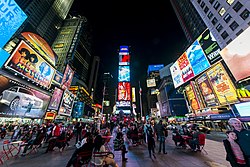Nightlife



Nightlife is a collective term for
History
The lack of electric lighting, as well as the needs for agricultural labor, made staying up after dark difficult for most people. Larger ancient cities, such as Rome, had a reputation for danger at night.[4] This changed in 17th and 18th-century Europe (and subsequently spread beyond) due to the development and implementation of artificial lighting: more domestic lights, added street lighting, and adaptation by the royal and upper social classes.[5] The introduction of chocolate, coffee and tea, and cafes that stayed open through dawn, became part of the new culture.[5]
Sociological research

Nightlife has been a vibrant area of research for
Some sociologists have argued that vibrant city nightlife scenes contribute to the development of culture as well as political movements. David Grazian cites as examples the development of
There is debate about the degree to which nightlife contributes positively to social capital and the public goods of society. David Grazian points out that nightlife can "replicate the same structures of race, ethnic, and class inequality and exclusion found in the larger society."[7]
Grazian cites the use of dress codes by some nightlife establishments in the United States—mostly nightclubs—that specifically targets clothing popularized by hip hop culture represents a form of informal discrimination and segregation on racial grounds.[7] He also noted that nightclubs and club culture can create an environment that encourage or tolerate the "harassment and degradation of women," citing the expectation that both female workers and patrons of bars and nightclubs engage in highly sexualized performances of femininity including dressing in a particularly sexual manner in order to gain entrance to clubs.[7]
Modernity impact
The supervisioned use of lighting in contrast to daylight, is correlated with human control over the use of
Regulation

Australia
Nightlife venues must be licensed to serve alcohol.
United Kingdom
Nightlife venues must be licensed to serve alcohol under the Licensing Act 2003 (and the Licensing (Scotland) Act 2005 in Scotland). Venues with door security ("bouncers") are also required to ensure that the security staff are licensed by the Security Industry Authority.[13]
Since the introduction of the Licensing Act 2003, pubs and bars have been able to apply to operate until later. For nightclubs, this has become a form of competition as patrons can stay in the same pub or bar rather than move on to a club.[14]
United States
In the United States, legislation affecting nightlife is handled primarily at state and local levels.
References
- ^ Flannigan, Jenna; Miscone, Michael (January 18, 2011). "A history of NYC nicknames". Time Out New York. Archived from the original on September 5, 2017. Retrieved August 20, 2022.
- ^ "Nightlife - Definition of nightlife by Merriam-Webster". merriam-webster.com. Archived from the original on June 18, 2015. Retrieved June 18, 2015.
- ^ Klein, Stefan (2008). Time. p. 20.
- ISBN 9781321349702. Retrieved December 23, 2022.
- ^ Atlantic Magazine. pp. 82–83.
- ^ "Ray Oldenburg". Project for Public Spaces. Archived from the original on July 2, 2015. Retrieved June 18, 2015.
- ^ JSTOR 40542603.
- ^ Smith, John (2020). "Nightlife in Modern Cities". Journal of Urban Culture. 15 (2): 78–94.
- ^ "Global Nightlife Tourism: Trends Shaping the Industry". London: Euromonitor International. 2021.
- ^ Li, Wei; Wang, Hao (2019). "The Impact of Social Media on Nightlife Experience Creation". International Journal of Contemporary Hospitality Management. 17 (2): 89–104.
- ^ Rachel, Gibson (2020). The Evolution of Urban Nightlife. New York: Routledge.
- ^ Lee, Sungho (2020). "Evolving Urban Spaces and the Nightlife Scene". Journal of Urban Development. 42 (1): 45–60.
- ^ "Licensing Act 2003". legislation.gov.uk. Archived from the original on July 2, 2016. Retrieved June 17, 2015.
- ISBN 978-1-84593-551-1. Archivedfrom the original on January 8, 2016. Retrieved November 14, 2015.
